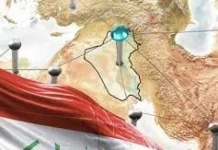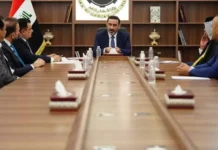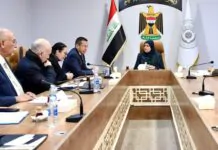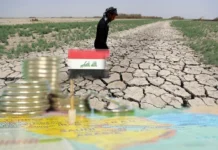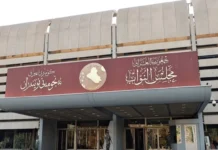Tishwash: Learn about the “secret operations room” that monitors the pulse of the Iraqi economy and protects the dinar from fluctuations.
While the domestic debate continues regarding the exchange rate and the future of the dinar, the Central Bank of Iraq’s recent statement on the tasks of its Investment Department has revealed another dimension to the monetary landscape—one that is deeper, less visible, yet highly influential.
This department, which manages foreign reserves and balances global market risks, is now described by economists as the “silent backbone” of the Iraqi economy, alongside oil, and the foundation upon which the most significant financial transformations underway in the country are taking place.
Economic expert Nasser al-Tamimi confirmed to Baghdad Today that the department has transformed in recent years from a traditional bureaucratic unit into a true center of gravity, preserving the stability of public finances and defining the Central Bank’s room for maneuver in the foreign exchange market. He told Baghdad Today that the prudent management of foreign assets—from government bonds to gold, deposits, and low-risk instruments—has enabled Iraq to weather the waves of global market turmoil and mitigated the impact on the dinar and the country’s financial balance.
The Central Bank’s technical statement, while employing specialized language regarding balances, transfers, and investment plans, nonetheless attracted the attention of international experts who analyzed its implicit messages. Bankers point out that the Central Bank’s explicit declaration that the department’s activities aim to stabilize the exchange rate does not necessarily mean an immediate appreciation of the dinar.
However, it is a strong indication that preparations for a stable monetary reform have effectively begun. These experts believe the Central Bank is waiting for the “safest moment” to take any significant steps, given the extreme sensitivity of the Iraqi market.
Any adjustment to the exchange rate system—whether an appreciation or a restructuring—requires a robust structure capable of absorbing shocks.
At the heart of this shift, two phrases in the Central Bank’s statement caught the attention of experts: “operational continuity” and “risks associated with oil revenue currencies.”
These are phrases typically used in international contexts related to deep monetary reforms and preparing for potential fluctuations that may accompany opening up to global markets.
Specialists interpret this as part of restructuring Iraq’s financial sector infrastructure in line with IMF recommendations, the requirements for joining the World Trade Organization, and gradual integration into the global financial system.
However, the most sensitive transformation is not limited to the investment sector alone, but encompasses an entire system being developed in parallel.
Starting Saturday (November 22), all cross-border payments in Iraq will transition to the ISO 20022 standard, the system adopted by the most advanced economies. Furthermore, all banks in Iraq have been mandated to finalize their capital plans according to the ICAAP model and undergo rigorous stress tests to demonstrate their ability to withstand exchange rate fluctuations of up to 30%, a collapse in oil prices, or a sudden run on deposits, while maintaining their solvency.
Economists believe these two steps are not merely technical updates, but rather represent—quite literally—the final two key conditions that the International Monetary Fund, the US Treasury Department, the Bank for International Settlements, and major correspondent banks in New York and London stipulated must be met before Iraq could fully participate in the international foreign exchange market.
They emphasize that the fundamental problem with the dinar today is not its market value, but rather that Iraq remains “blocked” from the global exchange market, and that adopting Basel III-ICAAP and ISO 20022 standards is what will pave the way for gradually lifting this blockade.
Analyses indicate that the Iraqi dinar remains trapped in a restricted market, unable to be traded in large quantities except through the daily dollar auction. Furthermore, prior to adhering to the new standards, local banks appeared structurally unstable to international banks, and their payment channels relied on outdated SWIFT systems dating back three decades, placing them under suspicion of money laundering.
Now, with banks required to disclose their actual capacity to absorb shocks, the pretext that prevented major international dealers from dealing directly in dinars is diminishing.
In this context, experts believe that Iraq is nearing the end of the “forced peg” of its exchange rate, which effectively began in October 2021 when it was announced that “the rate will remain fixed until 2025.”
With this date approaching and the technical requirements for monetary reform being finalized, some believe that Iraq may be entering a new phase that might not be a direct revaluation of the dinar, but which will at least pave the way for a more stable and transparent exchange market.
Al-Tamimi concludes by saying, “Oil provides the funds, but it is the investment department that ensures those funds are not lost to market fluctuations.”
He adds that the next phase may witness an expansion of the department’s role in regulating monetary policy, and that the strength of reserves and the stability of the banking sector will be the most decisive factors in the future of the dinar. link
Tishwash: A highly anticipated US visit and Savaya’s appearance at the Pentagon send strong messages about a “completely different phase” in Iraq.
What does Washington have up its sleeve?
Baghdad is preparing to receive a high-level American delegation in the coming days, at a time that suggests Washington has decided to move from a phase of quiet observation to one of targeted intervention, coinciding with the redrawing of the power map after the elections.
The visit comes as the controversy surrounding the surprise appearance of US Special Envoy Mark Savaya at the Pentagon has yet to subside, less than four hours after the same coordinating body announced its formation as the “largest bloc”—a move widely interpreted as a direct political message rather than a routine meeting.
Political sources confirmed to Baghdad Today that the American delegation’s visit is not merely a protocol visit, but rather carries a clear position regarding the formation of the next government. Washington wants a stable and effective government that does not reflect parallel power structures.
The US administration believes its political and economic support is contingent on Baghdad’s ability to establish a governing framework that prevents armed groups from influencing executive decisions and ensures that the instruments of power remain solely in the hands of state institutions.
Behind these messages lies the issue of uncontrolled weapons, a central focus of the American approach. Washington believes the incoming government will face a direct test regarding the role of factions within the political process, the nature of their participation in governance, and the limits of their security influence.
Diplomatic sources believe the United States wants clear commitments before fully recognizing the new government and may escalate pressure if it perceives the political equation as shifting toward a factional government with significant parliamentary influence.
The economic dimensions are equally, and perhaps even more, present than they appear on the surface. The US administration is preparing to revive major projects such as investment in Baghdad International Airport, which has returned to the forefront as a strategic project no less important than oil and energy.
There is talk within US circles of a desire to develop the airport through operational and investment partnerships that would provide it with an advanced operational infrastructure and connect it to a broader network of commercial air transport. There is also a push to expand US investment in oil and gas fields and to develop the energy, transportation, and port sectors, as these are considered key to long-term economic stability in Iraq.
The appearance of Savaya within the Pentagon has given these files an added dimension. International relations expert Hussein al-Asaad, speaking to Baghdad Today, believes that placing the Iraqi file on the desk of the Secretary of Defense, rather than the State Department, reflects a shift in Iraq’s focus from diplomatic discussions to direct U.S. national security concerns.
Al-Asaad explains this shift as a result of growing anxiety in Washington regarding the future of foreign forces, the activities of armed factions, threats related to regional conflict, and the nature of the next government and the potential changes it might bring to the balance of power.
Al-Asaad points out that Savaya, with his economic background, represents a bridge between the security and investment sectors, making his presence at the Department of Defense a sign that Washington is now dealing with the Iraqi file as a complex issue that combines security, politics, and economics. From this perspective, the United States’ aspiration to restructure its economic presence in Iraq is no longer separate from its security vision, but rather complements it.
As for the timing, diplomatic sources confirmed to Baghdad Today that publishing photos of the meeting just hours after the announcement of the “largest bloc” coordination framework was not a spontaneous move. According to these sources, Washington wanted to send a clear signal to the political forces that the formation of the next government would be under direct scrutiny, and that the United States would not be lenient with any political formula that weakens the state or opens the door to unchecked influence.
Observers believe that Iraq finds itself at a critical juncture with multifaceted dimensions. Political forces are moving towards forming a government that, thus far, appears to lean heavily towards the influence of armed factions. Washington is intensifying its messaging through the anticipated visit and the movements of the Savaya delegation. Economic issues are resurfacing strongly, from the airport to the oil fields to energy projects. And the regional environment is exerting significant pressure on the shape of future policies in Baghdad.
Between these overlapping circles, the next phase appears governed by a delicate equation: no governmental stability without calming the security situation, no international support without a clear economic vision, and no internal balance without redefining the boundaries of political and military influence. At the heart of this equation, the United States stands closer than ever to the government formation process, at a moment when the first outlines of the coming years are being drawn. link
************
Tishwash: Kurdistan Finance Ministry: Salaries of those not registered in the “My Account” project will be suspended at the end of this year.
The Ministry of Finance and Economy of the Kurdistan Regional Government announced on Thursday that the salaries of civilian and military employees who have not registered themselves in the “My Account” project will be suspended based on a decision by the Federal Ministry of Finance.
The ministry said in a statement seen by “Al-Eqtisad News” that all employees, security affiliates and beneficiary families who have not yet filled out the “My Account” project form will have their salaries suspended when the September salary is disbursed until the form is completed.
She noted that families whose bank card procedures have been completed but who have not yet received their cards must visit the banks to receive them, indicating that the October salary will be disbursed exclusively through the “My Account” project.
The Ministry of Finance confirmed that about 90% of the employees of the Kurdistan Region, both civilian and military, in addition to those receiving salaries, have completed the registration process, while some of them are still not registered.
She explained that, according to the decision of the Federal Ministry of Finance, any employee or beneficiary in the region who does not have a bank account and does not register in the “My Account” project by the end of this year will have their salaries suspended from Baghdad and will not be disbursed in the region.
She pointed out that the disbursement of salaries after the beginning of next year will not be in cash at all, and that anyone who causes a delay in the registration procedures will bear the legal and administrative responsibility link

